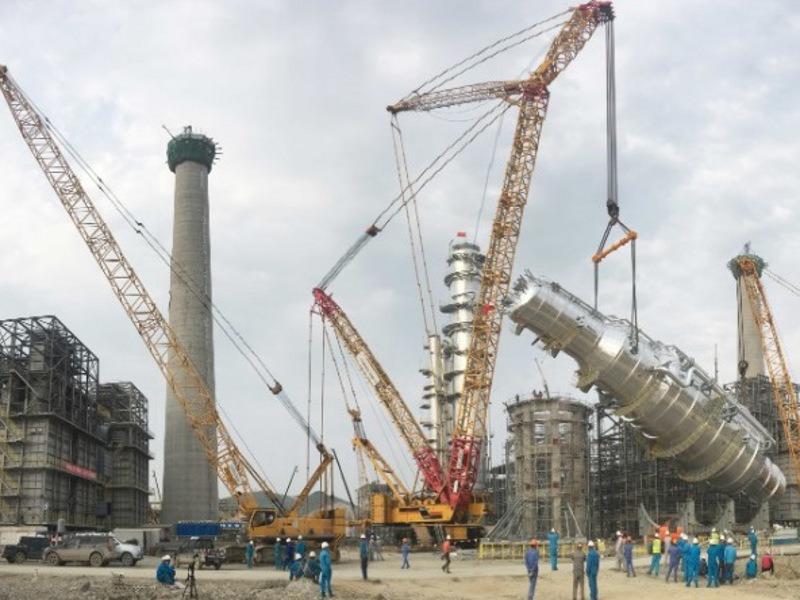Saudi Aramco's MTBE capacity is expected to grow once its purchase of SABIC's petrochemical units is complete - a move announced shortly before its debut bond

Saudi Aramco is in the process of acquiring petrochemicals giant SABIC (Credit: Zhejiang Petrochemicals)
Saudi Aramco’s methyl tertiary butyl ether (MTBE) capacity is expected to become the largest in the world once its $69bn (£53bn) purchase of Saudi Basic Industries Corp’s (SABIC) petrochemical units is complete.
The deal will see the oil giant own a 70% share in SABIC and boost its capacity to 2.37 million mt/year, according one of S&P Global Platts sources.
Aramco currently operates one 150,000 mt/year MTBE unit and another 120,00 mt/year facility in Saudi Arabia, located in Rabigh and Yanbu, respectively.
The country as a whole produces the most MTBE of any nation in the Middle East and Asia, with more than 3 million mt/year of capacity.
China is a close second with 2.47 million mt/year, while South Korea and Taiwan are third and fourth, with 994,000 mt/year and 680,000 mt/year, respectively.
The purchase of SABIC
On 27 March, Saudi Aramco announced plans to purchase a 70% majority stake in SABIC from the Public Investment Fund of Saudi Arabia for $69bn (£53bn).
The company said its deal is part of its strategy to enhance its downstream portfolio and increase its refining capacity from 4.9 million to between 8 and 10 million barrels per day by 2030 – with between 2 and 3 million of that being converted to petrochemicals.
Its CEO Amin Nasser said: “This transaction is a major step in accelerating Saudi Aramco’s transformative downstream growth strategy of integrated refining and petrochemicals.
“SABIC is a world-class company with an outstanding workforce and chemicals capabilities.
“As part of the Saudi Aramco family of companies, together we will create a stronger, more robust business to enhance competitiveness and help meet rising demand for energy and chemicals products needed by our customers around the world.”

Abdulaziz Al-Judaimi, senior vice president of Aramco’s downstream branch, added: “Saudi Aramco’s downstream strategy is focused on meeting global customer needs by securing outlets for our crude oil through the expansion and growth of our refining system and deepening its integration with petrochemicals production.
“We are pursuing partnerships and acquisitions where we create long-term value, and developing groundbreaking crude-oil-to-chemicals technologies.
“SABIC is a good strategic fit and a solid platform to support our continued investment for future growth in petrochemicals – the fastest growing sector of oil demand.”
Headquartered in Riyadh, Saudi Arabia, SABIC operates in more than 50 countries and has over 34,000 employees.
Saudi AramcoMTBE capacity growth plans follow bond debut
Aramco’s plans to acquire SABIC are part of its extensive expansion plans, which build on its debut bond that saw it rank as the most profitable company in the world.
The company generated a gargantuan $111bn (£85bn) last year, comfortably topping second-placed Apple’s $59.5bn (£45.6bn) which became the first company to be valued at more than $1tn (£770bn) in August.
Samsung, Google’s parent company Alphabet and JP Morgan Chase came third, fourth and fifth with $35.1bn (£26.9bn), $30.7bn (£23.5bn) and $30.7bn (£23.5bn), respectively, while Aramco’s industry rivals Shell and Exxon Mobil took home little over $20bn (£15.4bn) a piece.
Senior oil and gas analyst at the GlobalData firm Anna Belova said: “As the world’s most profitable company, it can be argued that Aramco does not need to resort to debt-offering and that the bond serves as a secondary purpose to inspire confidence and offer new transparency into its finances, as the company fires up its global expansion strategy.
“Beyond the stated goal of acquiring SABIC [Saudi Basic Industries Corp], Aramco is pursuing multiple gas, midstream and downstream opportunities worldwide, one of which is a large stake in a new Russian-integrated LNG project – Arctic LNG-2.
“Following Aramco’s prospectus release, details began to emerge that the company’s share in Arctic LNG-2 will exceed 30%.
“With similar timing the government of Turkmenistan highlighted that Aramco could participate in the giant TAPI pipeline, connected Turkmen fields to India’s markets.
